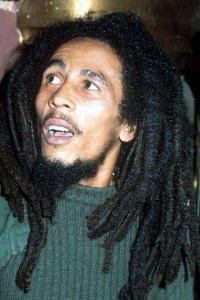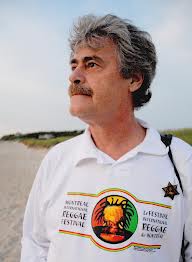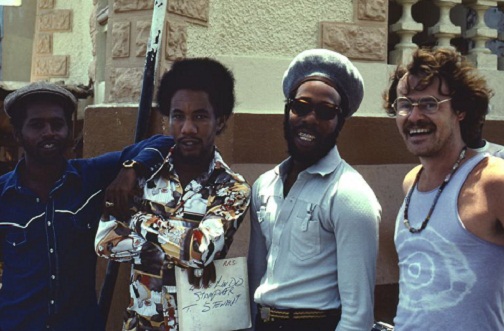Top: Roger Steffens (right) with Big Youth (second right), Tinga Stewart (second left) and unidentified friend at Idlers Rest in Kingston, 1976.

Bottom: Mary Steffens at Tuff Gong Record Shack on Orange Street, downtown Kingston—.
KINGSTON, Jamaica –
For over 30 years, Roger Steffens has earned a reputation as an authority on Bob Marley and the Wailers. The massive archive of Marley/reggae memorabilia at his Los Angeles home has attracted reggae’s elite and Hollywood A-listers like Leonardo DiCaprio.
But Steffens had a cache of slides close to his heart under lock-and-key for almost 50 years. With the help of his children, they have been digitised, posted on Instagram and become subject of feature stories in Time and New Yorker magazines, and on CNN.

Bob Marley
Most of the photos were taken by Steffens, his first wife, and his friend, famed American war correspondent Tim Page. They cover Steffens’ service in the Vietnam War, his year-long stint in Morocco and his first visit to Jamaica in 1976.
“The huge acceptance of my non-reggae art has been a tremendous surprise for me. The New Yorker ‘takeover’ that they invited my daughter Kate to do has yielded more than 2,500 new followers to our own site,” Steffens told OBSERVER ONLINE.
“At the age of 72, I realize that now is the ‘someday’ in my life that I’ve always been dreaming of: to someday have enough time to go over the 300,000 images I’ve shot and do something important with them.”
Steffens got a lot of help from his son Devon and daughter Kate. Last year, Devon digitised 40,000 of the chrome slides his father took between 1967 and1993, while Kate posted two photos daily on Instagram.
Many of the photos were taken in late 1976 when Steffens and his wife Mary arrived in Jamaica which had just been placed under a State of Emergency by Prime Minister Michael Manley.

Roger Steffens
They will be part of The Family Acid, a book the Steffens family plan to release in January. After decades of travelling the world lecturing on Marley and reggae, Steffens stressed the special nature of his latest project.
“I’m thrilled because it embodies all four of us in the Acid Family,” he said.
Like many Americans of his generation, New York-born Steffens discovered reggae in the early 1970s through independent radio stations and small record stores in liberal Southern California, as well as the movie, The Harder They Come.
He eventually hosted his own reggae radio show (Reggae Beat) in Los Angeles and interviewed Jamaican artists when they were in Southern California for shows. The biggest of these acts was Marley, who Steffens met in 1979 while he was promoting his album, Survival.
The Family Acid is one of three major projects Steffens has in store for 2015. The others are the book, So Much Things to Say: The Oral History of Bob Marley; and a documentary, Livicated: One Man’s Quest to Preserve the Culture of a Country.









